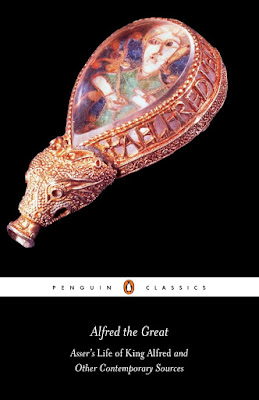Alfred The Great - Asser's Life Of King Alfred & Other Contemporary Sources
Review By Tom
Rating: 10/10
"I am astonished at this arrogance of yours, since, through God's authority and my own you have enjoyed the office and status of wise men, yet you have neglected the study and application of wisdom. For that reason, I command you either to relinquish immediately the offices of world power that you posses, or else to apply yourselves much more attentively to the pursuit of wisdom" - Alfred the Great, Asser's Life Of King Alfred ch. 106, pg. 110
A quote for modern times? Most definitely. Alfred has fast become a hero of mine, as he praises wisdom and intelligence alongside prioritising learning and education for all people from the bottom to the top. Asser's Life is the best contemporary account of Alfred the Great, as the Welsh Bishop was a member of his court. This biography compiled with contemporary sources really gives you an insight into the man Alfred was, and why he deservedly is part of the elite group of monarchs with "the Great" after their name. I was itching to read this book for a while and in a time where leadership seems to be floundering like a fish in the bottom of an empty barrel (makes the beginning quote seem more relevant, doesn't it?), harking back to the great King of the West Saxons has been a morale booster. Living in the area that Alfred ruled over definitely made the reading experience much more immersive, as I was familiar with the places where these events were set. However, don't let my locality stop you from picking up this book!
Although there is a theory that Asser's Life isn't actually completely due to it's abrupt end, and work stopped in 893AD, 6 years before Alfred's death in 899AD (Asser died in 909AD, so plenty of time to complete it!), it is a vastly fascinating contemporary account charting Alfred's rise to the throne, his multiple victories of the Vikings, most notably over Guthrum the Old in 878AD at Ethundun (Edington, Wiltshire), and his struggles and rise again from his temper seat at Athelney in Somerset. Asser is sure to praise Alfred for championing piety, wisdom and education as well as political intelligence and astuteness. Even though he is suspected to have struggled significantly in the throes of Crohn's disease, it never stopped his determination and ambition to make Wessex a powerhouse and a well educated one at that! Asser's Life itself is a rarity and special among early medieval texts as only the great Charlemagne has a biography of this kind. Whilst there are references to the Anglo-Saxon Chronicle, it's easy to believe that Alfred had a significant input into his own biography, so as much as it is Asser's writing some of the book feels distinctly Alfredian. Alfred had a very simple political policy, to fortify the Burhs which lead to a semi-standing army at all times, educate people, and make sure that the kingdom has a strong treasury whilst showing generosity to those in need. It inspired loyalty and respect from people in all walks of life.
As a master learner, Alfred translated a few works in his lifetime, with excerpts included in this book. Meticulous in some instances and more liberal in others, Alfred's translations were copied and sent out across Wessex for people to learn from. The reason they could learn these texts was because they were the first of their kind to be translated into English. This meant that through religious education, the people of Wessex had access to the works of philosophers of Rome. Alfred translated Gregory's Pastoral Care, Boethius's Consolation of Philosophy, Augustine's Soliloquies and passages from the Psalter (Book of Psalms). Whilst he changed some passages to favour internal conversations with reason and wisdom within a religious sphere of influence over the original author's self-pitying passages, demonstrates how great a thinker he was. Whilst these can be a bit of dry reading with over flourishing of religious sentiment, it was all part of Alfred's scheme to educate the masses. Other sources include extracts of some of Alfred's laws, written down in his law book. Which proved he was no pushover when to came to handing out justice (and significant finds). Alongside this you find his will, the treaty he had with the aforementioned Guthrum the Old, and many more.
This for me is a truly insightful book, and I would consider it essential for those looking for a strong starting point to get to know the man that Alfred was. His political policies are something that we would revere today as everyone benefited, and his strong leadership under the incredible pressure of a nearly complete Viking conquest is phenomenally inspiring. He would lay the foundations for England to become England (which his sons picked up the mantel enthusiastically, learning to his grandson Æthelstan to become the official first king of England). To hold education and wisdom in such high regard and to implement its distribution to as many as possible in their native tongue put him before his time in the late tenth century. After reading this I feel so much more acquainted with this great Saxon king, a man, myth and legend in many ways, but most importantly to me a very thoughtful and inspiring figure in English history.






Comments
Post a Comment